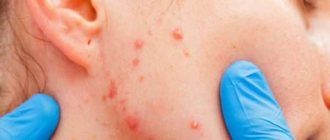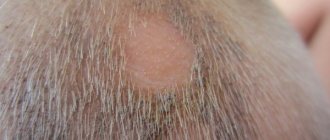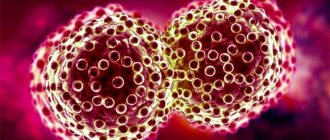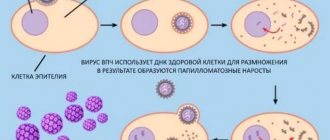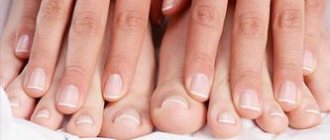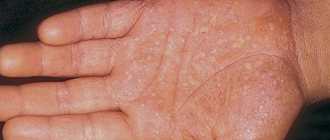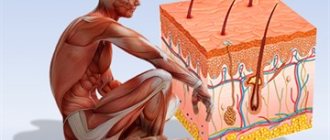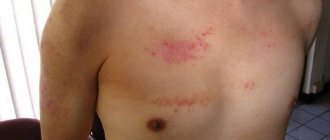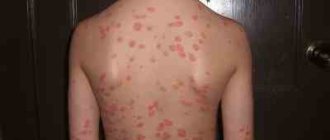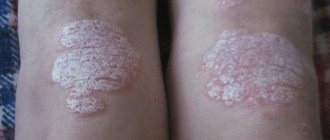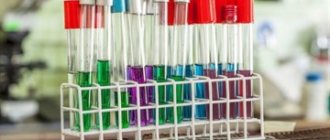Psoriasis is a complex systemic disease. Scientists have not yet found an exact answer to the question of why psoriasis occurs. Whether it spreads from person to person is another popular question. Although the disease does not look at all aesthetically pleasing, there should be no concern about its contagiousness.
Patients often have complexes, since many people try to avoid those whose skin they see any changes for fear of getting infected. This disease is often confused with other diseases, which is why such hostility arises. It is similar to other, contagious diseases. The factors behind its appearance are different, as are the methods of transmission.
Causes of psoriasis
Psoriasis is a non-contagious disease, therefore it is not transmitted from a sick person to a healthy person (for example, through the use of personal items, through saliva, sexually). Unfortunately, scientists are still studying the etiology of the dermatological disease, despite its increasing popularity.
However, experts in this field voice one of the main factors in the occurrence of the disease - a genetic predisposition to skin disease. There is a possibility that psoriasis can be inherited.
In those suffering from skin pathology, mutational changes occur within the skin cells of the body. Psoriatic papules develop mainly in individuals who have a predisposition to the disease. Sometimes the disease manifests itself in grandchildren. A characteristic feature of psoriasis is that a person does not even imagine that the disease can develop at any time.
Along with the genetic factor of the origin of the disease, several more reasons can be identified:
- Consequences of past infectious diseases. Pathogenic microorganisms that have a negative impact on the general condition of the body negatively affect human skin. At the same time, scientific studies have shown an insignificant likelihood of developing pathology without a pre-existing predisposition to psoriasis. According to scientists and distinguished doctors in the field of dermatology, infection can speed up the process of the disease emerging from its latent state.
- Allergic reactions. Some medical luminaries believe that psoriasis is one of the types of allergic manifestations due to the influence of certain foods or viruses.
- Metabolic and immune system disorders. The occurrence of problems with metabolic processes leads to the accumulation of an excessive number of lymphocytes in some places of the epidermis, and then a rash and inflammation appear. At the same time, the patient, as a rule, has a genetic predisposition to the pathology. In addition, a person’s weak immunity exposes him to the development of many serious infectious diseases (tonsillitis, sinusitis, tonsillitis, and so on) and allergic reactions.
- Hormonal imbalances. Disturbances in the natural activity of the endocrine system lead to deviations in the regenerative functions of the human skin epithelium.
Psoriasis takes people who are unaware of the development of this pathology by surprise. It is usually a consequence of severe nervous shock, prolonged depression or other nervous system failure. Psychosomatic disorders trigger a mechanism of metabolic disturbances in the human body, which in turn leads to the development and exacerbation of skin diseases.
In addition to psychosomatics, the situation is negatively affected by the presence of an infectious disease in the patient, such as influenza, ARVI, sinusitis, tonsillitis, otitis media, caries and other diseases.
According to the above, we can conclude that dermatological pathology is contagious only if a person has a genetic inheritance for the disease or has suffered severe forms of infections. In this connection, it is obvious that with weak immunity, the likelihood of the disease occurring is much higher.
Find out more
Is the disease inherited or not?
Psoriasis is not completely transmitted genetically, but only as a variant of predisposition.
Also, each patient has his own “own” psoriasis, since there are many varieties of the disease, which differ in the characteristics of their course and therapy.
In the presence of a predisposition at the gene level, the body reacts to the factors that trigger the disease differently.
Psoriatic disease also has different manifestations in women, men and children.
The transmission of the “psoriasis gene” from parents to a child is a scientifically proven fact - about 50% of children whose parents have psoriasis also have a predisposition to it. If one of the parents is ill, psoriatic pathology is diagnosed in 10-25% of children. The disease may not make itself felt until the age of 30-35, and develop only in adulthood or old age - when immune mechanisms weaken and metabolic processes in the body become less intense.
The predisposition is already present in the genetic code of the fetus - it already contains some “defective” genes that form it in the child’s body to this pathology. Genetics have not yet discovered a way to stop this transmission of “psoriatic genes” from older generations to subsequent ones.
The first symptoms of psoriasis
To confirm the diagnosis, it is mandatory to undergo examination at a medical institution. Characteristic symptoms of psoriasis are:
- Scarlet spots with defined edges, especially in places where the skin is damaged.
- Formation of peeling in the center of papules.
- Severe itching in areas of the rash (occurs in people with weak immune systems).
Skin pathology is characterized by gradual growth of the rash. Usually small plaques appear, which after a few days begin to multiply on the body, becoming covered with gray scales. The initial stage lasts no more than 2 - 3 weeks, and then the spots increase in size and unite, their number increases significantly.
The rash can be localized anywhere: on the elbows, arms, legs, head, nails, face. The disease appears even in children (including infants) and the elderly.
Is psoriasis contagious?
Whether psoriasis is contagious or not to others will be asked by people who have relatives, friends or acquaintances with this diagnosis. To answer this question, it is necessary to classify dermatological pathology as a specific type of disease.
Another name for the disease is lichen planus, which most people perceive as a contagious skin disease transmitted by contact through animals and people. Moreover, apart from external similarity, these 2 diseases have nothing in common. Psoriasis is not a contagious skin pathology of the skin, so living with a person suffering from it is not only possible, but also necessary. The patient needs the support of family and friends, so it is worth paying attention to him. Warmth and trusting relationships with the sick person will only benefit him.
Both women and men suffer from this disease, but in the fair half of humanity it occurs more often, and they tolerate it worse. The onset of skin pathology occurs during hormonal changes in the body in adolescents and up to 25 years of age, since at this time the formation of the endocrine system occurs, which is favorable soil for the disease. Unfortunately, scientists cannot fully figure out the origin of the disease.
Is it inherited?
Heredity is perhaps the only scientifically proven cause of the disease. When a diagnosis is made in parents, there is a huge likelihood of developing the disease in their children.
Scientists have found that the culprit is genes responsible for a predisposition to psoriasis. The development of the disease manifests itself with a certain impulse - factors that were written about earlier in the article. It is not difficult to diagnose it from medical professionals, so it is necessary to start treatment on time.
Is it transmitted through contact with a sick person?
Whether psoriasis is transmitted from person to person is a topic that worries many people. Unsightly scaly papules on some parts of the body cannot be hidden from prying eyes. Those around you who do not have special knowledge in the field of medicine are suspicious of unknown phenomena. Having seen rashes on the body of another person, they will avoid communicating with him, believing that they have encountered a carrier of a contagious disease on their way.
Dermatological pathology is called scaly lichen, which many associate with a disease transmitted through touch, namely ringworm, which children can become infected with after playing outside with kittens and puppies.
Since ancient times, humanity has expelled and even destroyed people affected by psoriatic plaques. Scientists' studies did not lead to encouraging predictions, suggesting that they were caused by infections, but could not find evidence.
It is impossible to become infected with skin psoriasis, so there is no need to run to get tested after communicating with a patient. The only way to acquire a disease is through inheritance. There are no other ways to get infected.
Psoriasis and sex
Is psoriasis transmitted during sex through contact with someone who is sick? Patients of dermatology departments ask their attending physicians about this question. Considering that psoriasis is not a sexually transmitted disease, it is not possible to infect it through the proximity of a partner.
Meanwhile, the signs of syphilis, a sexually transmitted sexually transmitted disease, resemble psoriatic skin rashes. With syphilis, the skin becomes covered with plaques with purulent sacs, ulcers and blisters. The rash may also peel. Having discovered these symptoms, especially if you have had unprotected sexual intercourse, you must urgently take a blood test for laboratory testing.
As we have seen, psoriasis cannot be acquired through bed, but sexually transmitted infections can easily be acquired. Moreover, some of them masterfully disguise themselves as psoriasis. So, if you discover suspicious rashes on your skin, immediately contact a specialist to confirm or refute the diagnosis.
Psoriasis and blood transfusion
According to materials contained in scientific sources, several patients with dermatological diseases experienced a significant improvement in the condition of the epidermis after bone marrow transplantation. Conversely, there are rare cases of acquiring the disease from a donor who had psoriasis.
As scientists explain, the skin disease develops as follows. Cells of the immune system, in response to a provoking factor (psychosomatics, infectious diseases, etc.), move to the zone of influence of such a factor, and inflammation occurs. First of all, keratinocytes respond to disruptions in immune processes in the body, and rapid division of epidermal cells occurs, which leads to the formation of psoriatic rashes.
Probably, during a blood transfusion, the culprits in the development of the pathological process were precisely the immune cells in the donor’s blood, as well as bone marrow stem cells. Please note that the cases cited above are isolated, so there is practically no risk of contracting psoriasis through a blood transfusion.
Principles of treating the disease at home
It is not possible to completely eliminate the disease even with the most expensive and intensive treatment. In most cases, psoriatic manifestations reappear after a long period of remission. Nevertheless, treating psoriasis and maintaining a state of remission for several years at home is possible, as is getting rid of acute symptoms and cleansing the skin of papules and plaques. The key principle of home treatment is to monitor the progress of the disease and prevent complications of psoriasis.
It is possible to treat pathology at home using the following means:
- ointments, creams;
- lotion;
- shampoo - in case of damage to the scalp;
- baths with infusions;
- decoctions;
- powders
However, before using any products, including those based on natural ingredients, you should consult with your doctor.
Consultation will reduce the possible risks of complications due to the use of inappropriate medications. All treatment options are aimed at alleviating the condition, as well as transferring the disease into remission.
In the case of home treatment, it is necessary to ensure compliance with all its rules, which include the following recommendations:
- During therapy with topical medications, it is necessary to protect the skin and nails from drying out. This is relevant when using baths. Also, it is imperative to use moisturizing creams, which allows you to preserve the natural moisture of the skin.
- In mild stages of the disease, it is undesirable to use powerful medications, since psoriasis responds well to herbal medications.
- To achieve the best therapeutic effect, before applying the medication to the skin, you need to carefully clean it of scales and crusts, after softening them.
- It is undesirable to use several drugs at the same time, since their drug interactions can give unpredictable results, and it will be difficult to identify the most effective drug.
- It is required to strictly adhere to a certain recipe and treatment regimen at home.
- In the case of air and sun baths, you need to carefully familiarize yourself with the reaction of the drug used to such influences - after using certain medications, you should not expose the treated areas to prolonged exposure to direct sunlight.
- It is important to adhere to a daily routine and diet. It is necessary to overcome addictions, since the therapeutic effect can be neutralized or weakened by alcohol and substances present in tobacco products. You need to reconsider your own wardrobe - wear clothes only from natural fabrics.
- A break is required after completing the course. The more powerful the medication was used, the longer the interval should be before resuming its use.
Compliance with these rules helps to enhance the therapeutic effect. Also, these recommendations help to avoid complications and negative consequences caused by unsafe medications. The basic rule is regular visits to the treating specialist and the doctor’s assessment of the patient’s current condition.
Prevention of psoriasis
If the pathology is not treated in a timely manner, it becomes acute. Scaly papules grow throughout the body and begin to bleed, the scalp becomes flaky, and the lesion can even affect the nails. All this makes a frightening impression on others.
Uninformed people begin to avoid people with psoriasis, fearing that they will become infected. The situation is even worse with children who have been overtaken by pathology. At school, healthy children bully them and consider them contagious. Young patients at the dermatology office are very worried about this; they may develop complexes.
Sick people have a hard time adapting to this diagnosis, and depressive states only worsen their general condition. As you know, psoriasis may not manifest itself for a long time until provoking factors arise: stress, infectious diseases, bad habits, and so on.
People suffering from skin diseases need the support of family and friends. It is the participation of relatives that will help patients cope with complexes and lead a full life. A healthy nervous system will have a healing effect on patients and help them enjoy life.
Genetic theory
As mentioned earlier, the pathology does not manifest itself in all people genetically predisposed to it.
This is due to the fact that the disease can only become active in conditions favorable to it or with the help of certain factors, such as:
- Salty, sweet, spicy food.
- Any alcoholic drinks, smoking.
- Chronic diseases.
- Diseases that provoke a decrease in immune activity.
- Hypothermia.
- Exchange disorders.
Therefore, psoriasis is a disease of systemic origin, since it can be caused by several processes that cause a malfunction in the body.
